Young mothers able to finish high school with their babies under Young Parents Education Program
Young mothers are often forced to give up school to raise their child — but an incredible new program is redefining early parenthood on a mission to help them finish their studies.
Education
Don't miss out on the headlines from Education. Followed categories will be added to My News.
When Aahlia fell pregnant with her smiley, energetic daughter Amora, the young mother wasn’t sure if she would ever set foot in the classroom again.
While her friends were focusing on school, part-time work and their social lives, the 18-year-old was attending medical appointments and coming to terms with parenthood.
At the same time, she had big dreams to become a veterinarian nurse — a goal she could only fulfil if she graduated high school.
Aahlia was determined to finished her secondary school education so she joined the Young Parents Education Program — an initiative set up to help young parents finish school while caring for their babies.
“Being able to bring Amora to school makes it a lot easier because I probably wouldn’t be able to go to school otherwise,” she said.
“I can have her on the table while doing my work, she can eat right next to me. It’s not distracting and it’s easier because I know what she is doing and where she is.”
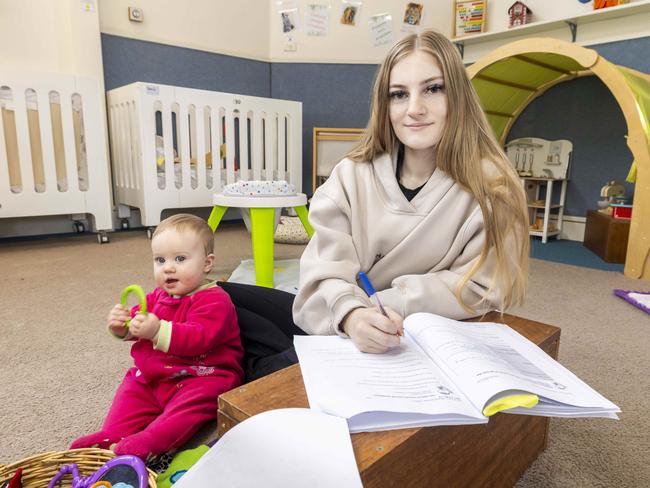
The Sunday Herald Sun visited the Narre Warren Foundation Learning Centre, which is one of three sites currently offering the program to a collective 32 young parents in Melbourne’s southeast.
While the learning centre looks like a mainstream education facility from outside, behind its classroom doors is a welcoming open learning space vibrant with colour.
In one section of the room, a row of desks and chairs surround a whiteboard, while students’ work decorate the windows and walls.
The delicious smell of freshly baked muffins wafted through the air on the day we visited, the scent coming from a kitchenette where students learn to cook.

Also in the classroom — just metres from where their parents are learning — is the babies’ nursery filled with toys, cots, puzzles and instruments.
This space allows students to bring their babies to class until they’re able to walk, with early parenting support practitioners available to care for them and offer advice on parenting and childhood development.
Young Parents Education Program (YPEP) manager Mary Tresize-Brown said a coalition of education, early childhood development, youth, health and local government stakeholders united to bring the program to life.
“The YPEP is an inclusive education setting for young parents to obtain year 12, increasing their capability to work and participate in the workforce, decreasing welfare dependence and improving family functioning,” she said.
“With over 1110 young parents in the region without Year 12 education, a clear and genuine demand exists for a tailored model that engages and retains pregnant and parenting students.”
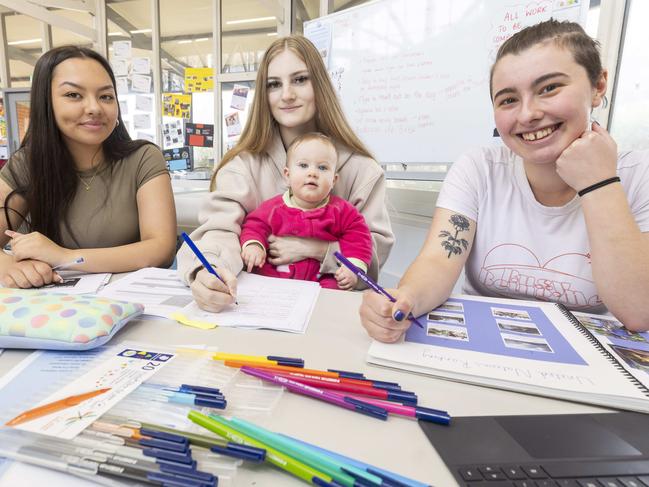
The program caters for pregnant and young parents aged between 15 and 20, and provides a supportive and flexible learning environment.
Young parents have access to qualified educators who teach literacy, numeracy, personal development skills and work related skills.
Upon completion of the program, students can obtain either a VCE Vocational Major certificate, a Victorian Pathway Certificate or the Certificate of General Education for Adults.
Lessons on early parenting skills, childcare and how to manage legal issues, finances and housing are also offered.
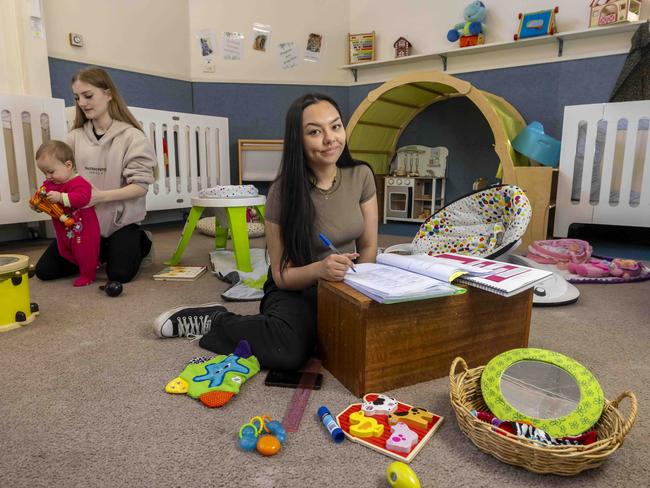
YPEP educator Sally Wood said the classroom structure was very different to mainstream classrooms.
“Students are encouraged to bring their babies into class while studying, which allows the young parents to bond with their babies while they complete their education,” she said.
“The learning space is designed to support optimal learning for both student and baby.”
Flexibility is crucial in the YPEP classroom, with the relationship between students and staff built on trust and respect.
“Our students know if they need to take a phone call for an appointment or need to come in later, this is never a problem,” Ms Wood said.
“A program such as our Young Parents Education Program would not be successful if it was structured like mainstream school.”
Early Parenting Support Practitioners Donna Strickleton and Katherine Bray also support the young mothers by assisting them with their babies while they’re studying.
“We do as much or as little as possible, being led by what the mothers want you to do,” Ms Strickleton said.
“Sometimes they want to do everything, whether that be feeding the babies their bottles or food, or putting them to sleep, and there’s others who want us to do everything and that’s fine too.”

Ms Bray said the practitioners also help parents build their confidence and empower them to succeed.
“We’re aware they’re each individual and unique parents with their own parenting style,” she said.
“I was a young mother myself, so I know I only ever felt that I could hand my child to someone I knew that would care for them as I would.”
Ms Tresize-Brown said the program encompassed three equally important parts – education, health and wellbeing, and the early parenting role.
“The YPEP operates in a similar way to other learning settings with educators, curriculum and structured learning plans,” she said.
“The biggest difference is the young parent brings their baby to class with them, while other main differences include start and finish times and days of attendance.”
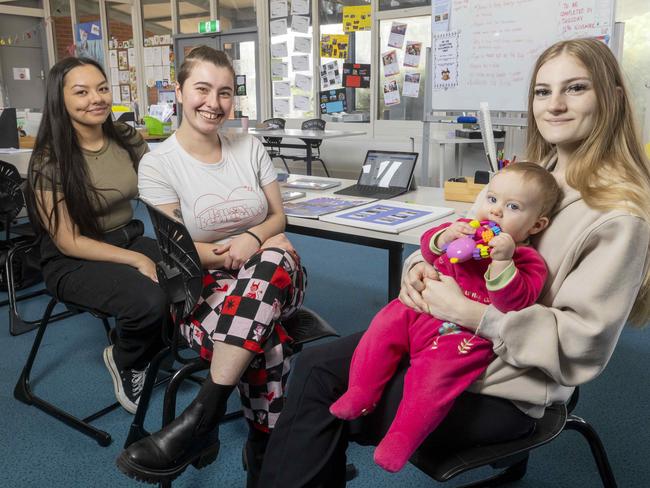
Students enrolled in YPEP also have access to wellbeing and transition coaches Kirstie Leach and Jen Orlandi from the Young Mothers Transition Program.
The pair offer individualised support to young mothers both in and outside the program, with their wellbeing, mental health, legal needs, housing and their transition into their chosen career pathway after school.
“The most rewarding part of our role is seeing the young mothers reach their goals, whether that be enrolling their child in childcare, finishing year 12, gaining employment, finding housing or just establishing themselves as an adult within the community,” Ms Leach said.
Ms Orlandi said the Young Mothers Transition Program (YMTP) also provided a link between young mothers, community organisations and medical services.
The YMTP is funded by the Women’s Leadership and Development Grant supplied by the Office for Women in the Department of the Prime Minister and Cabinet, which is due to finish on October 31 this year.
With the program’s attempts to secure another grant unsuccessful, the YMTP is now under threat, potentially leaving several young mothers without support.
“Without the funding there is going to be a lot of vulnerable young mothers,” Ms Orlandi said.
“(The responsibility) will fall on the educators in the Young Parents Education Program to try support all the young mothers with all these complex issues, which they’re not qualified to do.”
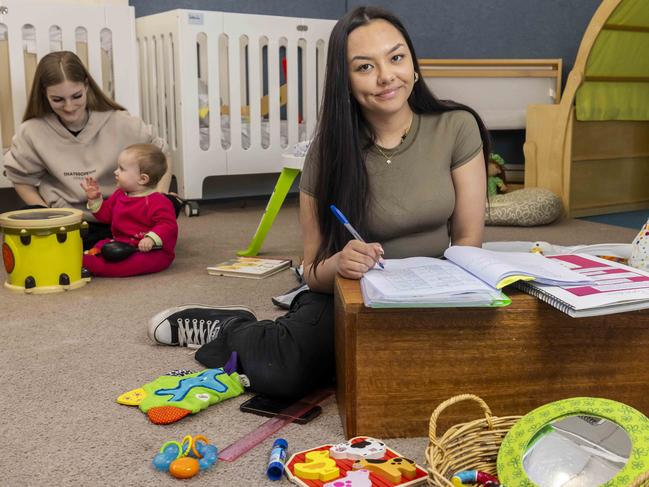
A Department of the Prime Minister and Cabinet spokesman encouraged the South East Local Learning and Employment Network (SELLEN), which runs the program, to register on GrantConnect to find out about future grant opportunities.
“In 2021, SELLEN was awarded a one-off grant through the Women’s Leadership and Development Program to pilot the Young Mothers Transition Project,” he said.
“We recognise the project has had a positive impact on the lives of young mothers in Melbourne.”
Ms Tresize-Brown is advocating for more programs like YPEP to be established in various locations across the country.
“My mantra is that the best thing every young person can do is to get a good education,” she said.
“A good education means having foundational year 12 and seeing that as the springboard to an apprenticeship, traineeship, further education in TAFE or employment.
“To help every young person pursue the pathway that’s important for them, it’s crucial we have a program where young parents can bring their baby to, complete year 12 and transition successfully to further education, training or employment.”
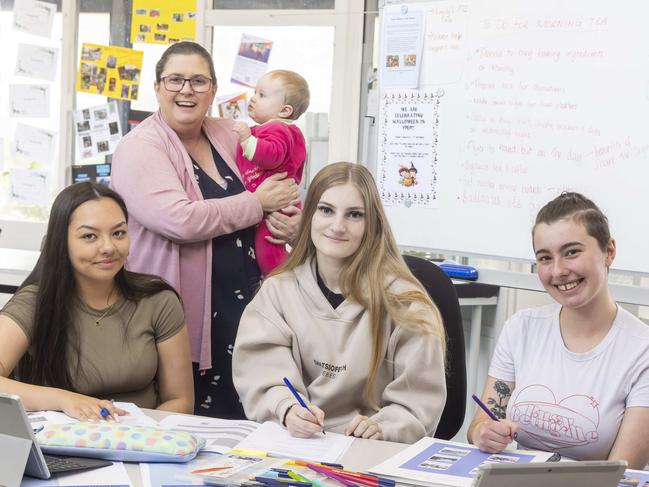
Ms Tresize-Brown also called on the government to allocate funding to young parent education programs across the nation.
“Accessible places of education are few and far between. If you live in a remote area and you’re a young parent, you’re disadvantaged when accessing education for young parents,” she said.
“The government must put their attention to young parents and provide for them as a vulnerable cohort, just as other vulnerable cohorts are supported to complete year 12.”
Young mother Phoebe is another student who benefited from the YPEP, with the program helping her return to school after having her son Ruby, now aged 2.
“I dropped out of school at 17 and I was a bit nervous to get back into studying, but I thought it would be a really good way to dip my toes in and it’s been a very relaxed way of learning,” she said.
The 23-year-old is working towards becoming a social worker.
“I don’t think I would have got back into study if it wasn’t for YPEP. It’s made it easy to transition from not studying to studying, and it’s made me more confident to want to go onto university,” she said.
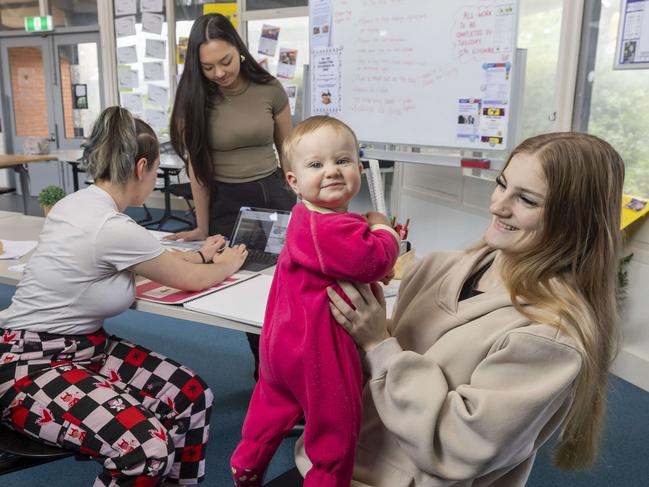
In addition to YPEP’s Narre Warren site, the program also runs at Cranbourne Secondary College and Foundation Learning Centre in Frankston. Classes are held between 9.30am and 2.30pm three to four days a week.
As for Phoebe’s words of advice to other young mothers who have had to give up school to raise their child, she said: “just because you have a baby young, it doesn’t mean your life is over”.
“YPEP is a great way to get back into study …. You have so many people here who are all supportive,” she said.
“It’s so important for young mothers to be able to believe in themselves and you can definitely get that here. You learn to trust yourself and life continues.”
For more information on the Young Parents Education Program, visit the SELLEN website – sellen.org.au/ypep/.




